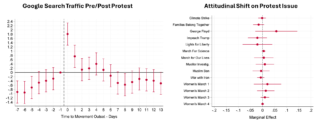When a Hashtag Isn’t Enough: The Hard Truth About Protests
In an era where hashtags trend faster than wildfire it seems logical to assume the sheer scale of digital engagement would translate into tangible political change. Yet, research spearheaded by Amory Gethin and Vincent Pons suggests otherwise. They examined US protests between 2017 to 2022 and their impact on Twitter buzz, Google search volumes, opinion change and enduring attitudinal shift.
Thirteen of the fourteen (93%) protests resulted in nothing beyond a fleeting, digital flareup. The one exception?
The Black Lives Matter protests following George Floyd’s death. These protests not only dominated media cycles but also managed to shift public opinion on racial discrimination and influenced voting behaviors in favor of Democrats—a rare instance of protest power translating to political impact.
The research underscores a critical challenge: maintaining momentum and interest beyond the initial burst of activity.
The chart on the left shows the aggregate impact of the 14 protests (listed on right) on Google search activity. The chart on the right shows the impact on political attitudes.
The uncomfortable truth, most protests are like fireworks—spectacular while they last but gone in a puff of smoke. It’s not enough to get people talking; the conversation has to be sustained and channeled into specific, actionable avenues.

So, what turns a protest into a movement that actually moves the needle on policy and public opinion? The answer isn’t in the digital echo chambers but in sustained, strategic action.
Here’s the kicker: digital activism often misses the mark because it’s easy. It’s easy to tweet, share, and post—and it’s just as easy to scroll past and forget. Real change demands more than this.
Firstly, successful movements have robust leadership—a far cry from the decentralized, headless nature of many modern protests. Look at the Civil Rights Movement under Martin Luther King Jr. or the Indian independence struggle led by Gandhi. Leadership matters.
Secondly, there’s the issue of persistence. Movements that make an impact don’t just show up; they stick around. They dig in their heels and keep the issue on the boil, long after the initial uproar fades. They turn the protest into a part of the public and political dialogue, not just a momentary blip on social media.
Finally, it’s about integration. Successful movements weave their point of view into the fabric of everyday discourse, gaining allies, not with fire and brimstone, but dialogue. And often, that dialogue must include perspective taking.
The digital world is transient. Real-world issues need real-world activism. Don’t settle for social media echo chambers, start building something that lasts beyond the next news cycle.
Kevin



Thank you for reminding people of the importance of strategic, sustained organizing. Protests can be effective, but especially when they build on that kind of base. I strongly recommend the book This Is An Uprising, by Mark and Paul Engler, for historical examples and how-to’s. https://www.goodreads.com/book/show/25273749-this-is-an-uprising